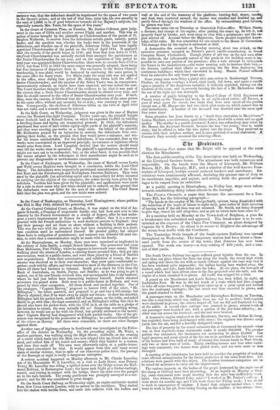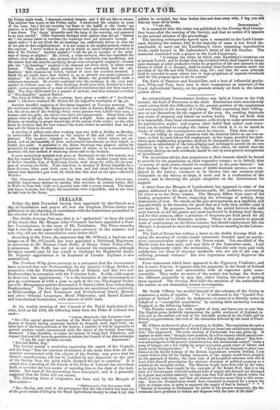lEbt tirobintes.
The Morning Post states that Mr. Bright will be opposed at the next election for Manchester.
The first public meeting of the Tea Association was held on Wednesday, at the Liverpool Sessions-house. The attendance was both numerous and respectable. On the bench were the Mayor of Liverpool, Mr. William Brown, M.P., Mr. Thornely, M.P., and a number of the well-known Free- traders of Liverpool, besides several eminent bankers and merchants. Re- solutions were unanimously affirmed, declaring the present rate of duty to be exorbitant, impolitic, and unjust; and setting forth the general advan- tages to be reaped from its reduction.
At a public meeting in Birmingham, on Friday last, steps were taken. towards establishing thirty infant schools in the borough.
The Preston Chronicle, a paper that favours the movement for a Ten- hours Bill, has the following paragraph-
" The hands in the employ of Mr. George Smith, spinner, being dissatisfied with the reduction of the hours of labour to eight daily, gave notice of their intention of leaving work if the old time was not resumed. Mr. Smith, not being disposed to give way, closed his mill altogether, and as yet no terms have been come to."
At a meeting held on Monday at the Town-hall of Brighton, a plan for a breakwater was submitted and approved. The breakwater is to be con- structed at the expense of the Chain Pier Company, on plans designed by Captain Sir S. Brown: its object is to secure to Brighton the advantage of the steam-boat traffic with the Continent.
The Tunbridge Wells branch of the South-eastern Railway was opened throughout on Wednesday. The temporary station had been about a thou- sand yards from the centre of the town; that distance has now been opened. The work was heavy—a deep cutting of 250 yards, and a tun- nel of 800 yards.
The South Devon Railway has again suffered great injuries from the sea. In more than one place where the lines run along the beach, the recent high winds and spring-tide drove the sea with so much violence against the road-way that it has been rendered quite unpassable: the ballast having been washed away, the timbers, rails, and tube, have fallen into the holes. At one place, the bowsprit of a vessel which had been driven close to the line projected over the rails, and the engine of a train smashed it to pieces. All traffic was stopped for a time.
A guard on the Manchester and Leeds Railway has been killed, by night, at Luddenden Foot. He was in the last track of a train which had been stopped to take off some waggons; a luggage-train came up at a great speed and dashed- into the stationary carriages; the last truck was thus smashed in pieces, and.. the guard crushed to death.
A passenger-train on the Manchester and Birmingham Railway, on Tuesday, ran into a coal-train which was shifting from one rail to another; both engines were shattered to pieces; the drivers leaped off, but one fell and fractured his leg at the ankle. A second-class carriage was crushed to pieces, several teeth of- one passenger were knocked out, with a portion of the jaw-bone adhering ; an- other was cut across the forehead; and the rest were bruised.
A locomotive engine employed on the Blackburn, Darwen, and Bolton Railway, has exploded, from being overcharged with steam: the engineer was thrown sixty yards Into the air, and fell a horribly disfigured corpse.
The loss of property by the recent extensive fire at Gravesend far exceeds what• was at first reported—some statements make it nearly 100,0001. The greater portion was uninsured, the insurances not amounting to above 25,0001. The. rapid progress and great extent of the fire are to be ascribed to the fact that most of the houses had been built of wood; of twenty-five houses burnt in West Street, only two or three were of brick. Thirty dwelling-houses and four other huild- ings were consumed; two houses were pulled down; and ten were more or less. damaged.
A meeting of the inhabitants has been held to consider the propriety of making more efficient arrangements for the future protection of the town from fires. Re- solutions were passed with this object. The London insurance companies are to. be asked for assistance to carry out the improvement.
The various inquests on the bodies of the people destroyed by the explo-ion of fire-damp at Oldbury have been proceeding. At an inquiry on Monday at Dud- ley, some statements were made showing that the mine was inefficiently veati- lated. One witness, Edward Foley, said—" I worked in Mr. Parker's colliery: I went about six months ago, and I left work there last Friday week: I was afraid to work in consequence of sulphur. I found that sulphur existed when I first went to work in the pit, from seeing blazing on the candles: it was always I here.. . On Friday night week, I dreamed comical dreams, and I did not like to return. The sulphur was worse on the Friday night. I mentioned the sulphur to some of the men; but I did not mention my fears to the bailiff, to the batty ' my master, or to Smith the 'doggy.' No explosion took place during the six months I was there. The 'doggy' generally used the lamp in the morning, and appeared to be very careful" Other workmen declared their opinion that the pit "wanted air"; the means taken to ventilate the workings were not extensive enough. A miner said—" I do not think the air-headings are sufficiently driven in nine out of ten pits in this neighbourhood: it is not usual in the neighbourhood, owing to the expense. I never worked in any pit in which so much sulphur existed as in that of Mr. Parker." Another stated—" I left the pit on account of the exist- ence of damp or sulphur." Mr. Elwell, a mine-surveyor, who has examined the colliery since the disaster, also declared that the ventilation was insufficient, and the means that did exist for purifying the air were not properly employed: in some pits the " air-headings" required to be cleansed out every week, in others every month. "This accident might perhaps have been prevented, had the =- headings' been cleansed out before, instead of since the accident occurred. I think the pit might have been worked so as to prevent any great explosion of sulphur." At the close of the evidence, Mr. Haines, the ground bailiff, made a voluntary statement. He shortly explained why the workings in the crop were carried on without more air: these workings would have been finished in a fort- night; and no complaints of a want of sufficient ventilation had ever been made to him. The Jury deliberated for a quarter of an hour, and then returned a verdict of "Manslaughter" against Haines.
The Jury at Oldbury, on the contrary, have given a verdict of "Accidental death "; but have censured Mr. Haines for the imperfect ventilation of the pit.
Another dreadful explosion of fire-damp happened on Tuesday morning. On the workmen's entering Mr. Ilargreaves's coal-mine at Euston Burgh, near Pres- ton, the air in one of the workings fired; seven persons were killed—four men, a woman, and two girls; six others were hurt, two dangerously. About forty other miners were in the pit, but they escaped with a fright. Some people blame the fireman, as wanting in proper knowledge of the nature of the works: on the other hand, he declares that the men entered the works before he certified that the pit was safe for them to descend.
A meeting of colliers and other working men was held at Dudley on Monday, to memorialize the Government on the subject of this and other colliery ex- plosions. The speakers enlarged on the dangers to which miners are ex- posed, and on the necessity of some authoritative interference on their behalf, to render pits safer. A memorial to the Home Secretary was adopted, calling for protection by means of Government inspectors of mines, or by a commission to ascertain the best method of rendering mines safe to the workers.
A most melancholy accident took place at Bambargh on the 14th instant, to a fine boy named Robert Wake, aged fourteen; who, with another young man, son of Robert Smeddle, Esq. of Bamburgh Castle, went along the rocks for the pur- pose of shooting sea-birds. Wake had been in advance of Robert Smeddle for a short distance, when some birds came in view, and had raised his head at the instant that Smeddle's gun went off, which shot hint dead on the spot.—Berwick Warder.
' The Gloucester Journal recounts that the swindler Wyndham, who so suc- cessfully duped many persons by opening false accounts at country banks, died in Wales in June last, while on a sporting tour with a young woman. The man's real name, it seems, was Page; his connexions were respectable, and at one time he had been in the Army.



























 Previous page
Previous page